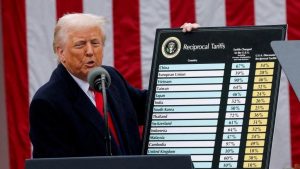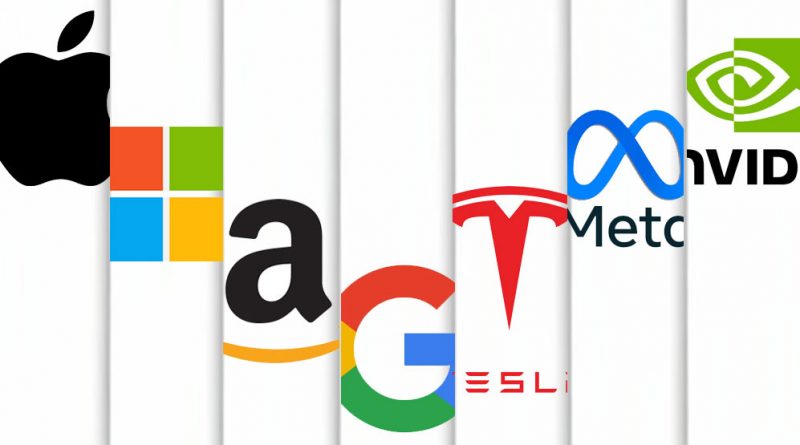The Effects of Tariffs on the Magnificent Seven

Matthew Gupta
Tech Editor
The Magnificent 7, made up of Amazon, Apple, Google, Meta, Microsoft, Tesla, and Nvidia, comprises the largest and most influential public technology companies in the world. However, questions are beginning to emerge, as these companies have collectively lost trillions of dollars in market cap. Over a 5-day period, the seven tech giants’ stocks lost between 4-13% of their value since Monday, March 31st, with Tesla losing over 10% of its value within a single day on Friday, April 4th. These market pressures come as the United States under President Trump issued large tariffs on its largest trading partners on “Liberation Day”, including China, the EU, and Canada, which has led to recessionary fears from investors, despite not yet seeing the full results of the tariffs. With this, a question arises: why are investors speculating that these tariffs will hit the M7 especially hard?
One reason that investors fear for the future of tech is the substantial disturbance in the global supply chain. These tariffs raise the cost of rare metals such as cobalt and gold for hardware components, semiconductors, and assembling products outside the domestic market. Apple is one company heavily affected by the shift in the supply chain, as it relies heavily on countries like Taiwan, where it sources its microchips produced by TSMC, and China, where iPhones and MacBooks are assembled. In the long term, companies can rethink their strategies, focusing on building their products closer to home. This has been a major part of strategy for companies like Nvidia, a microchip designer looking to produce its chips in Arizona through a partnership with TSMC, a company currently building a microchip factory in Arizona. However, this will take time, and will only decrease costs to an extent without government subsidies due to higher costs of labor and land. As a result, either consumers will ultimately eat the costs brought about by the tariffs, leading to fewer purchases and lower revenue, or companies will eat the costs themselves, hiking their expenses and lowering their profits. This shift in the global supply chain is why M7 members focused on physical products, including Apple, Nvidia, Amazon, and Tesla, are facing more investor uncertainty than Google, Meta, and Microsoft, which focus more on software.

These tariffs have also led to retaliation from other nations, as they attempt to keep their businesses competitive. China is a notable example of this, as it responded to Trump’s “Liberation Day” with a matching 34% tariff on US products entering the PRC. This heavily affects Apple and Tesla, as China is Apple’s third largest market, and Tesla sells around a third of its cars to the market. However, retaliation is not just limited to hard products and can still be affected by strict regulations on US companies. Nations will be implementing new regulations, restrictions, or even bans on American technology companies while promoting local tech companies. This is also prevalent in China, where the country has promoted its home-grown electric car producers through subsidies and political favors, especially BYD. A newer way nations are attacking software-focused companies is through Digital Services Taxes. Popularized by the United Kingdom, these taxes allow a country to tax the revenue of software companies that sell their products from outside the consumers’ national borders. The UK implemented a 2% tax on revenue from services provided in the kingdom, including searches and social media advertising. New regulations like these will heavily damage the bottom lines of Google, Meta, and Microsoft. Overall, these retaliatory acts by other nations make it harder and more expensive for these global corporations to do business globally, further decreasing revenues and increasing expenses.
With the ensuing trade wars, the obvious question becomes how consumers will react to the changes. The new tariffs and regulations will lead to consumers being more price conscious, and with increased costs due to either shifted, more inefficient supply chains, or companies eating the tariffs and hoping to pass costs onto consumers, people will not buy as many iPhones, Teslas, or products with Nvidia chips. Beyond just costs, individuals may likely shift away from American technology. Markets like China or India are passionate about supporting local companies and are now more likely to use locally developed technology. People will continue to move away from Google, Facebook, and Apple for local options such as WeChat, Weibo, and Samsung. With all these challenges, it will be paramount for the Magnificent 7 to navigate these times of political disruption if they and America wish to remain competitive in the future of technology.
Contact Matthew at matthew.gupta@student.shu.edu

